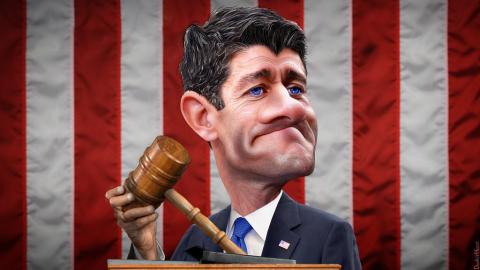Recorded audio and three eyewitness accounts of a Republican candidate physically assaulting a reporter with a "body slam" and punches isn't enough for voters in the red state of Montana to abandon him. That is what happened in Thursday's special election for the state's at-large U.S. House seat -- an election that can only be described as surreal.
ALSO SEE: No Holds Barred: Montana Election Gets Wild
It is exactly this kind of toxic, heedless partisanship on display in the Montana special election that has driven so many voters to abandon both parties in favor of being an independent voter. Non-affiliated voters have outnumbered registered members of either party for the last eight years.
https://www.youtube.com/watch?v=bC3zqk3f46w
Unambiguous audio of Greg Gianforte assaulting a reporter released on the eve of the election. Three Fox News reporters present as eyewitnesses said the Republican grabbed the non-threatening, well-mannered news reporter by the neck, slammed him to the ground, started punching him... and the next day Gianforte wins the election by a comfortable six-point margin?
What is wrong with this picture?
The only reason this can be is because Republican voters in this district and the GOP leadership who they take their cues from are so inflexibly, carelessly partisan that they are unwilling to do the honorable, obvious thing and at the very least stay home in droves, if they can't in good conscience vote for the other candidate because of his political views.
What this indisputable event, caught on audio and with eyewitnesses, shows us about Gianforte, is that he:
- Is extremely impulsive and foolish;
- Is very unpredictable and volatile under stress; and
- Has a severe (sociopathic) anger problem.
How can anybody vote for someone who exhibits these qualities so conspicuously on the eve of an election? Imagine how he might have acted if he were going into election day with a loss hanging over his head instead of an easy win?
What on earth does it take to disqualify someone from being a person we would want to have more power than they already do, any role of leadership and prestige, any say in how our society should be organized?
Republican leaders and voters cared more about what letter was next to Gianforte's name in this election than the quality of his character and the integrity of their own consciences and good faith.
Paul Ryan and other Republican leaders declined to withdraw their support and simply said Gianforte should apologize, instead of soundly rebuking him and saying they don't want someone like that in their caucus.
Hilariously enough, Ryan referred to Gianforte as a "gentleman" in his statement to the press, saying, "Should the gentleman apologize? Yeah, I think he should apologize." Representative Steve Stivers, chairman of the National Republican Congressional Committee said of the election eve assault, "We all make mistakes."
A local Montana TV station which was recently bought by the Sinclair Broadcast Group (which has a history of boosting Republican candidates on its 170+ outlets nationwide), refused to play the audio of the assault, calling it "unverified" even though not one, not two, but three eyewitnesses from notoriously GOP-friendly Fox News have verified that the recording is genuine.
Now just imagine the awesome spectacle of true leadership it would have been if Paul Ryan had shown that he cares less about how many Republicans are in the U.S. House than he cares about what kind of Republicans are in the U.S. House!
Even at the most cynical, optics-focused, brand strategist level of analysis, who would want a ticking time bomb like Gianforte - who's already blown up once, and with the worst possible timing - among their ranks, a representative of their brand?
Surely he's now a liability that might have to be answered for again. He could have been an example made of a party in touch with decency and character, a party that's guided by principles, a party that cares about what kind of party it is and not how big a party it is at any cost.
With this kind of blind, careless, extreme partisan politics and conspicuous vacuum of leadership or integrity, there's no wondering why the most common party affiliation in the United States for the last eight years has been no affiliation with any party. The more of this we get, the more independent voters there will be.
